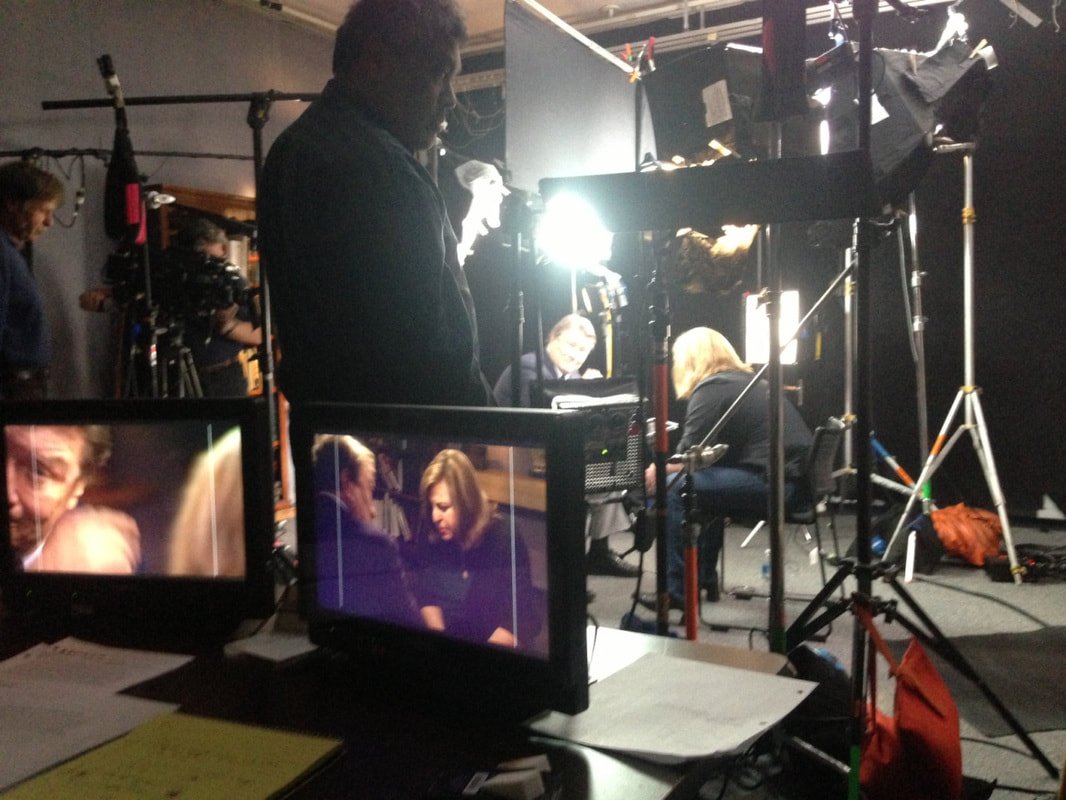|
CBS 60 Minutes is doing an extensive piece on mental illness with its correspondent Steve Kroft and are including “That Way Madness Lies…” as a story element. They were made aware of the film through our executive producer Alisa Thorne and plan to include footage from the movie as well as an interview with filmmaker Sandra Luckow. Sandra was extremely impressed with the two producers with whom she worked Coleman Cowan and Griffith Messick. Their journalistic integrity, sensitivity and transparency were beyond measure. Hopefully, it will increase people’s awareness not only of the subject matter, but the film as well so that the $750,000 budget can be met.
0 Comments
Let’s start with the positive. Here is to looking forward to the New Year of 2013. I hope it brings health and happiness to you all. “That Way Madness Lies..” has been accepted into the International Documentary Association’s Fiscal Sponsorship Program. Please get the word out and contributions can be made directly to the IDA and are tax-deductible. Time is of the essence. The fundraising continues and with much of the money you so generously contributed to this project, I have hired grant writer and Arts Consultant, Wanda Bershen of Red Diaper Productions to help with the laborious process of filling out grant applications at places like ITVS, Sundance and the Ford Foundation. My company Ojeda Films, Inc. has been accepted as a signatory of the Director’s Guild of America to allow me to make this film.
Unfortunately, the negative news is in the lead at the moment and this part of the update is difficult, almost unimaginable to write. Most of you are already aware of the bizarre and tragic set of circumstances that have influenced “That Way Madness Lies…” In the month of December my mother died in a tragic accident while retrieving Christmas decorations and my brother was too paranoid to come to the hospital to say goodbye and publicly blamed me for her death. The night after she died, there was the fatal shootings at the Clackamas Town Center mall where my brother and I had spent our teen years. He then made written threats to me before the memorial service that 325 people attended, but did not meet the legal criteria to be put on a 3 day psychiatric hold. Armed guards, local police and attendees with licenses to carry concealed weapons were present at the memorial. With the recent shooting in Sandy Hook and The Clackamas Town Center, along with our national denial to recognize and take action in the name of civil rights, my brother’s story is a graphic example of a broken system and a society whose priorities lack compassion. I am including, with this update, an article I wrote for the Oregonian. It was to be published last Saturday. At the 11th hour the Oregonian lawyers swooped in and pulled it, saying that they were queasy that I was potentially pointing out or suggesting that, due to my brother’s behavior and diagnosis, he had the potential to be a mass-murder. Well, yes. The evidence is overwhelming. How else are we to avoid such tragedies if we refuse to see, accept and act on what is in front of us? By SANDRA LUCKOW On the evening of December 11, 2012, I was sitting at my parents’ kitchen table in Oregon City surrounded by grieving relatives. I was trying to write a eulogy for my mother, who had died the previous evening, when my iPad began to ding and flash with a barrage of e-mail, and both the house phone and my cell phone began to ring incessantly. The calls and the e-mails were consistent: Was I all right? Had I been hurt? Was my 49-year-old mentally ill brother, a diagnosed paranoid schizophrenic, the Clackamas Town Center shooter? The only question I could answer was that I had not been a victim in the shooting. What about my brother Duanne? I called the Bridgeview, the half-way house where he was staying in Portland, but because of privacy rules, the receptionist could not confirm or deny his presence, even after I explained the circumstances. The television and Internet news were not releasing any information about the shooter other than he had been “neutralized.” I could read between those lines. He was dead. So at midnight I drove from Oregon City to downtown Portland. Fortunately, my fears about Duanne were wrong, and people chastised me as hysterical under the grief of my mother’s death. All I can say is that it is obvious they do not know what it is like to be dealing everyday with the unpredictability of mental illness. We, as a nation, are doing our level best to ignore the devastation wrought by mental illness and then become stunned and sorrowful for a few days when victims are claimed. Look at our ability to ignore. The Colorado movie theater shooter was mentally ill, the family unable to get care after repeated attempts. The Sandy Hook shooter was also mentally ill, and the same appears to be true in the Clackamas Town Center shooting. And if I had not had a plan A, B, and C in place for my mother’s Celebration of Life in Milwaukie, just five days after the Clackamas Town Center shooting, the 325 people in attendance could have been just another news headline. Again, hysterical-over reaction you say? Ignoring the obvious leads to tragedy, I say. My brother refused to believe that our mother was on life support in the trauma ICU when I informed him of her accident. He thought it was a plot to entrap him since both of my parents had restraining orders against him since March of 2012. She died surrounded by family and friends, but her son too paranoid to say goodbye. My mother fell off a ladder Dec. 6 while retrieving Christmas decorations at her Oregon City home. Our mother died on December 10, at 9:23 p.m., at the age of 71. Her accidental death is a painful shock to her family, friends and community, but dealing with my mentally ill brother in the wake of her death – and for that matter every day for the last three years – is beyond excruciating and almost impossible. I am relieved that my mother no longer has to deal with this insidious disease, the constant havoc it causes my family and slamming of doors when seeking help. As a nation we grieve over these recent shootings when, in fact, we did nothing to prevent them. I cannot mourn my mother because everyday I am fighting our system; trying to protect family and friends from my brother. My brother did not believe my mother died until he saw the obituary. When he found out that the Celebration of Life was to be on December 17, my birthday, he thought it a ruse for me to hold a party. The threatening emails began, laced with profanity: “I have played the matrix game of b.s. with my blood sister Sandra Luckow who is the character daughter of Satan and all his demons.“ "You sure want to go out with a bang, huh?” “I told you the freight train would smack you and your mind will implode like the twin towers.” I called Project Respond, Portland’s first-responders crisis unit that helped me get him committed in 2010 to a full 180 days at the Oregon State Hospital. I wanted a 72-hour psychiatric hold to protect people expected at my mother’s Celebration of Life. Project Respond saw cause to investigate, but they called me back after a brief visit with him saying he did not meet the criteria for an involuntary hold. He told them he had no intention of harming anyone. If they had looked, they would have found a recent conviction for criminal trespass as well as the two restraining orders. Incredulous to their findings, I passionately suggested that, “This is our chance to do the right thing. Do we need another Clackamas Town Center or Sandy Hook when we had every opportunity to prevent it?” I considered canceling the memorial. I had had a belly full of death and “unfortunate” circumstances in the previous week. Instead, I hired two armed guards for the evening; had the Milwaukie Police patrol the event; and there was at least one person at the ceremony with a license to carry a concealed weapon. Make no mistake, we are to blame for these policies we have championed in a short-sighted manner to make our lives seemingly more “pleasant.” The next day, my father, who has dementia, and my deceased mother received notice from Clackamas County Courthouse to appear in two days as Duanne was contesting the restraining orders. I prepared my father, as he suffered the loss of his wife of fifty years and the confusion of losing his son to schizophrenia for the hearing at 10:30 am on December 20, 2012. We arrived at the courthouse with everyone else who had been granted a hearing and there sat my brother. He did not acknowledge us verbally, but gave us a stare that can only be interpreted as hate. The judge bumbled through a series of questions, trying to make sense of the complicated situation of restraining orders, my limited conservatorship over my brother’s property, my mother’s now defunct conservatorship over my father, Social Security payees, etc. She refused any offer of clarification and snapped, “There is a process here and we are going to follow it.” Finally, she glanced at one of the documents and addressed my brother. “I see here that the judge’s name is circled in orange ink and there is a notation that reads, “You’re done, (expletive)! Any idea who put that there?” A little game of cat and mouse ensued and then my brother said that he could not reveal who had written it even though he knew. It wasn’t until the Judge felt a perceived threat that she saw any need to provide protection in her courtroom. Far too little too late, the judge inadvertently noticed the court had misread the dates on the restraining order and meekly apologized, noting that my brother should never have been granted a hearing in the first place. She asked Duanne if he had anything to say. He complained about the system and told the judge, “You are being watched.” “Who is watching me?” she asked. “There are two invisible people watching you.” At this point, a deputy entered and sat down. The judge said she called in a deputy not because anyone had done anything wrong or even inappropriate but rather to prevent anything from happening. “We want to keep everyone safe,” she said. In the wake of recent events in our country, is procedure, particularly bad procedure, simply a way to hide the judge’s own culpability as well as responsibility. We, meaning you and me, our neighbors, our cities, our politicians are allowing mental illness to crush us by tying the hands of first-responders and doctors with procedure and policy because we are scared of reverting to the times of straitjackets and lobotomies. Do we think so little of ourselves? We are the wealthiest nation in the world and yet completely morally bankrupt and cowardly when it comes to dealing with the mentally ill. Statistically, the mentally ill have a greater chance of being a victim than the perpetrator of a crime, so why, then, is this happening? The answer is shockingly clear and simple. We let this progressive disease fester too long. If we had we had a system in place to help these individuals when signs first begin instead of having to wait until imminent danger, a lot more people would be alive today. It is easier to say that a person has a right to be mentally ill and it is not our problem. Civil rights assumes full mental faculties, but the cost of that assumption is far more than any society, than any community, than any parent should have to pay. If a person broke his leg and was withering in the streets, he would be taken to the hospital, even against his will. And yet, a broken leg is not life threatening. Why does one have to be a danger to himself or others when it comes to the mentally ill? Sandra Luckow grew up in Clackamas County and began her filmmaking career as an undergraduate at Yale University. She now lives in New York and teaches documentary and narrative film production at Yale University School of Art, Barnard College and Columbia University. She is working on a feature-length documentary film account of her brother’s battle with late-onset schizophrenia. This is the first real post-reaching-our-goal update. Again, thank you for your generous support of “That Way Madness Lies..” In the midst of teaching two production classes this fall, one at Barnard College and one at Columbia University, as well as being an advisor to four freshman at Yale, I am gearing up for another shoot in Portland, Oregon probably around the first couple weeks of October.
My brother, Duanne, continues to live at the transitional housing, The Bridgeview, in southwest Portland, still in the depths of crisis and lacking any insight into his situation. His religious fervor and end-of-days writings have reached a new frenzy. He blames the government, the Rothchilds, Satan and me for all of his discomfort. Through a friend he did relay 80th birthday wishes to our father which I took as a hopeful sign. I am suing the squatter that has moved into his house and, who I recently found out, sold his entire workshop of machinist equipment (easily worth $200,000) for $20,000 cash. As my brother’s limited conservator to the property, not the equipment, I have absolutely NO recourse. She was paid in cash. Getting her off the property is going to be both tricky and costly. I can’t bar her from the property because her name is not on the court order for me to handle and sell the property. (However, the court is on my back for not proceeding to put the house on the market as ordered.) In the state of Oregon, if a person stays more than 7 days on a property, even if they were initially invited, they are considered a resident and cannot be kicked off. Eviction law does not apply to a squatter because there is no contract that has been violated by the squatter so the land-owner has no cause. So, 8-10 thousand dollars and maybe 6-12 months later, I have a chance of getting her out. Among the many tragedies of this situation is that she also is mentally ill and utterly belligerent. She and Duanne make it a full-time activity in filing complaints and counter complaints at every agency they have ever encountered. She insists that she bought the house from Duanne for $6000 and has the title to it even though my father’s name is on the deed and he did not sign it over to her or anybody. It astounds me that she is so protected and gets her day in court when she is so clearly in the wrong. A upstanding citizen would never get away with this sort of thing. This issue of “protection” of a mentally ill person is one that I truly want to explore in the film. I am beginning to understand that we are protecting not the person with the illness but our society from having to be proactive. It seems we are putting systems in place to relieve ourselves from the responsibility and therefore the liability of doing the right thing. It is, at the very minimum, frustrating and infuriating. I am going to be migrating information from Kickstarter to the websitewww.madnessthemovie.com. I hope that you will check it frequently. I am in the process of applying for fiscal sponsorship through the International Documentary Association. All grants and donations can go through them with the tax deductions that are available to a 501 ©3. With the help of some volunteers through professional networks, I am beginning the grantwriting process. If you have any suggestions considering the topic of this film, please do not hesitate to contact me. The film is currently budgeted at $750,000. We have raised a little over $40,000. I have just sent a large quanitity of 8mm and Super 8mm films to a lab for frame by frame digital scan and restoration. Some of these are home movies and some are movies my brother made as a young adult. It will be interested to see if there is anything in that footage that might suggest we would be where we are today. I am also looking into interviewing the woman my brother secretly married 12 years ago – and never divorced – who is 28 years his senior. We found out about this marriage two years ago when during his first hospital stay a social worker asked if he had ever been married and he replied, “Sort of…” So far, this woman has stone-walled my requests to speak to her. I also would like to interview the current object of my brother’s erotomania, a woman 19 years his junior whom he has never personally met; an Indigo Crystal Child who lives in Canada. I want to understand their perspectives, hoping that there are some keys to understanding my brother. So, there you have it for now. Enjoy the fall and all the variety of color it brings. I will be in touch. Sandra My Dear Backers of “That Way Madness Lies…”,
My heart is full and I am a bit light-headed by this Kickstarter experience. You have amazed me. We closed today with $39,020. I think what has touched me the most about this experience is your diversity: some of you are classmates from my school days, grade school, high school and college. There are childhood friends of Duanne and antique car fanantics (and I mean that in the most positive way) who worked, played and worked with Duanne. There are family members who contributed generous amounts with whom I have had only sporadic contact and relatives who have lived this nightmare daily and still made a contribution. Former bosses – even one who fired me several years ago– donated generously. You are colleagues at the universities where I teach and the support staff whose discretionary income is limited and still you chose to help. You are mental health professionals I have never met or met only in passing and you have reached into your pockets. How can I express what that kind of validation of the project feels like? Several of you are my mother’s Spanish students who treat her with such respect and adoration. Then there are my students who know full well that I think their money should be spent elsewhere and in their one act of rebellion openly defy me with their generosity. Many of you are my champions who, regardless of my project, push me forward with kindness and resources. Although I question your wisdom at these times, I love you for it nonetheless. And a good many of you, more that I’d like to think, are people who have been touched by the ravages that mental illness causes and believe in the value of this project. Money is a funny thing. I think money has the ability to spotlight the already inherent qualities or faults of a person by how they chose to spend it. My first step will be to get fiscal sponsorship through the International Documentary Association and begin applying for corporate grants. My brother’s story continues to unfold and I hope to be in Portland in September to do a shoot. I hope against hope that the ending to the film will not be similar to what happened this weekend in Colorado, although Duanne already posted on Facebook that it was a FBI entrapment of this man similar to one he had experienced. I will continue to contact you though Kickstarter, but I am also setting up our online community at www.madnessthemovie.com. Please stay in touch and remember that I am open to any and all comments or suggestions. Best, Sandra There was a fascinating article in the New York Times Magazine this weekend. Although it was about the author’s father and not her brother, the similarities in dealing with the system felt like a deja vu to me.
I am presently in the midst of hoping for criteria that Duanne creates to allow “imminent” danger to himself or others without anything really bad happening. I have been so willing to jump through the hoops of the system because our sad history of mistreating the mentally ill. When I was in college, my film professor/mentor Michael Roemer showed us a personal copy of Fredrick Wiseman’s Titicut Follies, a searing documentary that had been court-ordered banned from exhibition. “Just before the film was due to be shown at the 1967 New York Film Festival, the government of Massachusetts tried to get an injunction banning its release. The government claimed that the film violated the patients’ privacy and dignity. Although Wiseman received permission from all the people portrayed or the hospital superintendent (their legal guardian), Massachusetts claimed that this permission could not take the place of valid release forms from the inmates. It also claimed that Wiseman breached an "oral contract” giving the state government editorial control over the film. However, a New York state court allowed the film to be shown. In 1968, however, Massachusetts Superior Court judge Harry Kalus ordered the film yanked from distribution and called for all copies to be destroyed, citing the state’s concerns about violations of the patients’ privacy and dignity. Wiseman appealed to the Massachusetts Supreme Judicial Court, which in 1969 allowed it to be shown only to doctors, lawyers, judges, health-care professionals, social workers, and students in these and related fields. Wiseman appealed to the United States Supreme Court, which refused to hear the case. Wiseman has pointed out that he received permission from all of the people portrayed in the film or else their legal guardian, in this case the superintendent of Bridgewater. He believes that the government of Massachusetts, concerned that the film portrayed a state institution in a bad light, intervened to protect its own reputation. The state intervened after a social worker in Minnesota wrote to Governor John Volpe expressing shock at a scene involving a naked man being taunted by a guard. The dispute marked the first known instance in the history of the American film industry that a film was banned from general distribution for reasons other than obscenity, immorality or national security. Little changed until 1987, when the families of seven inmates who died at the hospital sued the hospital and state. Steven Schwartz represented one of the inmates. Schwartz’s client who was “restrained for 2 ½ months and given six psychiatric drugs at vastly unsafe levels - - choked to death because he could not swallow his food. Schwartz claims that, “There is a direct connection between the decision not to show that film publicly and my client dying 20 years later, and a whole host of other people dying in between. In fact, “In the years since Mr. Wiseman made ‘Titicut Follies’, most of the nation’s big mental institutions have been closed or cut back by court orders. In addition, “the film may have also influenced the closing of the institution featured in the film.” (Wikipedia) Because of those images, indelibly etched in my mind’s eye, I have had the patience to deal with a system that is broken in every way, albeit a reaction to the way things were. Maybe this film can help influence the over-correction in the system where it is nearly impossible to provide care and care that is, indeed, available. Duanne saw the Kickstarter site yesterday. He “liked” it and reposted it on his Facebook page. Of course everyday, I worry about exploiting him for the greater good. It has been interesting to see how the stigma of mental illness is affecting my extended family. The American side of the family has come out of the woodwork and been tremendously supportive. The Mexican side of the family (with one exception) has stone-walled me and the topic. I know it is cultural and I know that shame is toxic. So, onward and upward toward our goal. Please take an active part in telling people about the project. I know that we get funded. Thanks. Sandra |
AuthorSandra Luckow is an award winning filmmaker based in New York City. Her films include: Sharp Edges; Belly Talkers; A World Within; That Way Madness Lies… Archives
December 2018
CategoriesSign up for our email list to be notified every time the blog is updated.
|
Ojeda Film, Inc.'s film "That Way Madness Lies..." is a feature-length documentary about one man's paranoid schizophrenia, told in-part from his point-of-view with a collection of iPhone video clips he made before being committed to the Oregon State Hospital in Portland, Oregon. Please donate today to help support this groundbreaking film.
|
Sign up for our email list to receive updates about the film.
|
Website by Susan K. Shepperd, Graphic Design
|


 RSS Feed
RSS Feed












